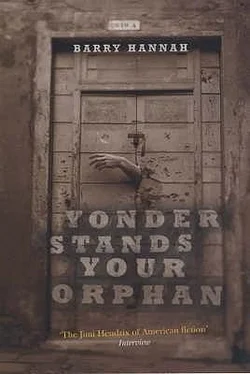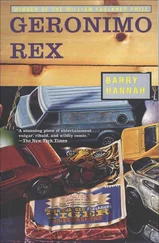Melanie watched him and wondered why he had fought. For this home?
Last week a rain had come on suddenly and so white that her mind reflected to another rain in Caw, Texas, in the thirties, when she was a child. She was on the esplanade in front of the hardware store waiting for her father, a cattleman and well digger, inside. She was abruptly frightened by a white rain out of earthquake thunder, a rain of such density she could not discern buildings across the street. She looked five minutes into a writhing blanket of it and believed she saw forms go over, arms of darker frantic air. She had not seen a rain like this since, until last week on the cove when she was watching the heavy black man fishing from his bucket. She could not make him out in the downpour and thought it was because he was not there, was someplace dry. Yet when the rain dispersed, the man still sat holding his cane pole in the mist. He was drenched and he was singing. His motorbike lay in a puddle, knocked over by the storm.
It was a feat how he balanced his buckets and pole on the skinny machine. Big sandaled feet banked on either peg like underwings. The fish were in wire baskets saddled across the fender behind him.
She wanted to be his friend but was not sure how to go about it.
When you take someone for a friend, you feel you owe him something, she decided. You have owed him far back into unconscious time and will spend the rest of your days giving to him. The man brought tears to her eyes. White hair and wearing overalls, unconscious of her. She watched him pour Stanback powder into a Pepsi one afternoon. Then he drank it down in one draft. She wondered if he was a saint. If he had served a larger power without whimpering these years while she had served almost nothing but civility. Her parties among the chattering phlegmatists of the campus. Driven from fecklessness to symbols. And yourself , she thought in her nainsook, you want him to be Uncle Remus goes to war, then the old happy fishing patriot. Who am I, old as he is and more? I might be an advanced case of local poet. A trivial and obvious woman, alone . She wrote nothing.
Melanie had not seen many white men having fun or even smiling in Caw, a town thickly grim even by Texas depression standards. Most were Christian, but their music was dirges and they would rather nod than talk. Once musicians came to town in a dusty Airstream trailer towed by a Mercury. They did not mean to stop here, but they had no money for gas to move on westward, perhaps to Auburn, where one of them had an aunt of substance. They set up in the street and began to play.
One of them was a Negro who played trombone, a man of some girth like the present John Roman. He was not young but still had the face of a boy in his jowls. He wore spectacles. Nobody had seen anything like this. The man was from Galveston, dark as French coffee. Four men gathered around the front of the band, peering directly at the chubby Negro. Melanie was uncertain whether they intended to harm the dark man or were mesmerized by him. They were unschooled in an audience’s relationship to a band, these weathered white men in gabardine pants or overalls and each with a felt George Raft hat the color of lead with sunspots and sweat lines on the crown. They stood right in the faces of the reed players on their folding chairs, planted almost in the band itself.
The sun made perfect high noon. This was no time to hear jazz, this Tuesday. Nor was any a good day in this part of Texas, she supposed, staring at John Roman asleep on his lard bucket.
The Negro trombonist might have been playing for his life. He set his horn and face, that face of a happy boy in rims of flesh, and never closed his eyes, as she saw other horn men do in later days. She knew one of the white men was a Baptist preacher who’d once ordered an unrepentant man’s death as he sat drunk and cursing in bedroom slippers with his sex loose under a vomitous white shirt. One of the assassins his brother.
In the street before the one-room school, students of all heights stood at the window for a sight of the band. The bandsmen were unaware of interrupting school, and Melanie did not know whether the white men cared. The band kept playing, an open suitcase on the ground before them where folks might toss coins, but three tunes and none had dropped a penny. Urchins stood behind the legs of the men. The black man began getting happier and happier in the face around the big mouthpiece. He was the soloist often, with only bass fiddle and drums and tinkling piano nursing the silences.
Grown children now stood behind the others, and a little Chinese-Cajun man in a straw hat with an ethereal crown carried a bucket of water to the survivors of the music. A carpenter began nailing and sawing on planks across saw-horses at the hardware door four buildings northward. The hammer popped squarely like shots. The carpenter was good, off in his own dream. Then the Negro began to shuffle and dance during the trumpet solo. The dust rose around his polished brogans, his brown ankles went pigeon-toed and duck-footed, without hosiery.
The bell of the trombone seemed to Melanie like a cave for an elf city. The man worked the plunger with violence and trembling. He danced and danced and then played with the rest toward the end and they desisted.
The carpenter was walking rapidly to the band, urging himself through the crowd. He held a hinged-lid trunk clean-squared, nail heads sunk smoothly, an artifact of instant cabinetry. He knelt to remove the open suitcase and lock it. Then he put the trunk in its place, drawing the lid back. “So as not to get your luggage dirty,” he said to the bandleader, whose hands had left his accordion as if to prevent blows on his person.
Then the rain of coins into the box began. The weathered men backed away. The spectacled boy in the face of the fat black man had never stopped smiling. Melanie dropped in her dime. She understood the man had saved his own life and her eyes grew wet in love for him. His music, the boy in the man’s face, his peril.
Returned to our world, the next day she saw an eagle eating a gar carcass where John Roman had sat.
Wootie had been nearly a saint until the last, she thought. Goodness would wear you down too, God knows. You needed to see a bit of hell now and then. That and great joy. Would she ever have them? It seemed goodness was eroding her now, driving her into something flat and simple-headed.
At the bottom of her lawn was the pier. Old men gathered there, working on a sort of great cruising porch, a pleasure barge, under the supervision of Dr. Harvard. Dr. Harvard loved Melanie with a dreadful love, although she did not know it. His own wife, Nita, had cancer, so this pleasure craft could not be for her. He said it was for them all, for mild adventures up the enormous reservoir and for good philosophy and conversation, but it was really for Melanie. He was white-haired with a face unlined, four years older than Melanie. They were pretty old people and seemed matched and destined for a couple. Although there was the wife, taking her time to pass on, and Harvard, an ex-surgeon heavy with honors and thick with dignity, who could not declare himself. He wore his honors lightly, but the love of Melanie was like a tow chain locked around his neck.
Among the other old was Sidney Farté, with his shingles and bitterness, in starched shirts so stiff they seemed to make the little man into a kite, whispering with curses, bouncing in agony from one breeze to the next. Ulrich carried on with his new emphysema. He wore floral shirts and had cut down to five enormous Benson & Hedges cigarettes a day. Tall Pete Wren and his dog, Son, remained the only earnest fishermen of the pier crowd. Wren a master bluegill fisherman with fly rod and a Wake Island prevaricator who had borrowed the biography of his cousin and written a letter from a Private Martin Lewis testifying to his captain’s heroism. The local VFA gave a ceremony in Vicksburg with great belated reverence until the actual hero Wren was rolled in, sad but not angry at the cousin he had not seen in years. Pete Wren was a colonel who had made his rank in the Oregon National Guard.
Читать дальше











